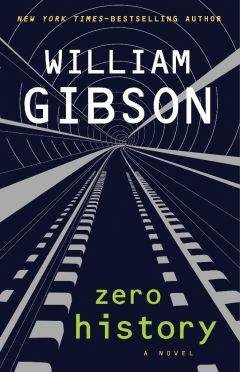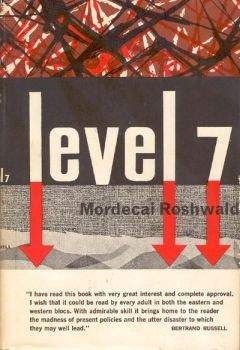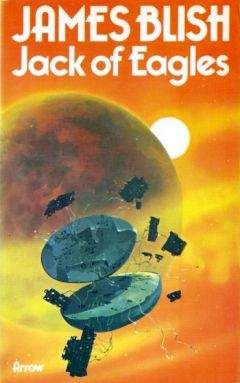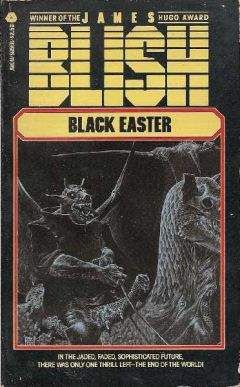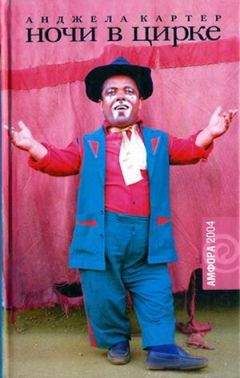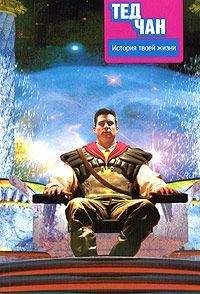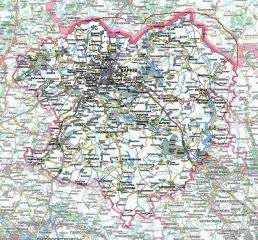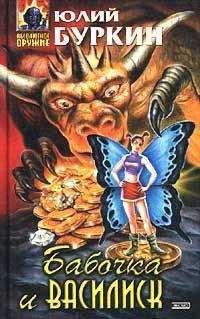Connie Willis - Blackout
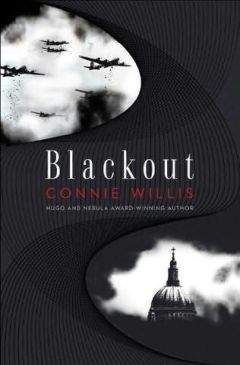
Скачивание начинается... Если скачивание не началось автоматически, пожалуйста нажмите на эту ссылку.
Жалоба
Напишите нам, и мы в срочном порядке примем меры.
Описание книги "Blackout"
Описание и краткое содержание "Blackout" читать бесплатно онлайн.
In her first novel since 2002, Nebula and Hugo award-winning author Connie Willis returns with a stunning, enormously entertaining novel of time travel, war, and the deeds—great and small—of ordinary people who shape history. In the hands of this acclaimed storyteller, the past and future collide—and the result is at once intriguing, elusive, and frightening.
Oxford in 2060 is a chaotic place. Scores of time-traveling historians are being sent into the past, to destinations including the American Civil War and the attack on the World Trade Center. Michael Davies is prepping to go to Pearl Harbor. Merope Ward is coping with a bunch of bratty 1940 evacuees and trying to talk her thesis adviser, Mr. Dunworthy, into letting her go to VE Day. Polly Churchill’s next assignment will be as a shopgirl in the middle of London’s Blitz. And seventeen-year-old Colin Templer, who has a major crush on Polly, is determined to go to the Crusades so that he can “catch up” to her in age.
But now the time-travel lab is suddenly canceling assignments for no apparent reason and switching around everyone’s schedules. And when Michael, Merope, and Polly finally get to World War II, things just get worse. For there they face air raids, blackouts, unexploded bombs, dive-bombing Stukas, rationing, shrapnel, V-1s, and two of the most incorrigible children in all of history—to say nothing of a growing feeling that not only their assignments but the war and history itself are spiraling out of control.
“You always sound like an idiot, Michael,” Charles said, grinning. “Or should I be calling you by your cover name so you can get used to it? What is it, by the way? Chuck? Bob?”
Michael handed him his dog tags. “Lieutenant Mike Davis,” Charles read.
“Yeah, I’m keeping the names as close to my own as I can since the segments of this assignment are so short. What’s your name for Singapore?”
“Oswald Beddington-Hythe.”
No wonder he’s practicing self-defense, Michael thought, setting on the bed the shoes Wardrobe had issued him. “When are you going, Oswald?”
“Monday. Why was your drop postponed?”
“I don’t know. The lab’s running behind.”
Charles nodded. “Linna says they’re simply swamped over there. Ten drops and retrievals a day. If you ask me, there are entirely too many historians going to the past. We’ll be crashing into each other soon. I hope they postpone my drop. I’ve still got masses of things to learn. You wouldn’t know anything about foxhunting, would you?”
“Foxhunting? I thought you were going to Singapore.”
“I am, but a good many of the British officers there were apparently County and spent all their time discussing their foxhunting exploits.” He picked up the dress whites Michael’d slung over the chair. “This is a naval uniform. What was the U.S. Navy doing at the Battle of the Bulge?”
“Not the Battle of the Bulge-Pearl Harbor,” Michael said. “Then the second World Trade Center bombing, then the Battle of the Bulge.”
Charles looked confused. “I thought you were going to the evacuation of Dunkirk.”
“I am. That’s fourth on the list, after which I do Salisbury and El Alamein.”
“Tell me again why you’re going all these extremely dangerous places, Davies.”
“Because that’s where heroes are, and that’s what I’m observing.”
“But aren’t all of those events tens? And I thought Dunkirk was a divergence point. How can you-?”
“I’m not. I’m going to Dover. And only parts of Pearl Harbor are a ten-the Arizona, the West Virginia, Wheeler Field, and the Oklahoma. I’m going to be on the New Orleans.”
“But do you actually have to be on the boat with Lord Nelson or whoever it is? Couldn’t you observe him from a safe distance?”
“No,” Michael said. “One, the New Orleans is a ship, not a boat. Boats are what rescued the soldiers from Dunkirk. Two, observing from a safe distance is what historians were stuck doing before Ira Feldman invented time travel. Three, Lord Nelson was at Trafalgar, not Pearl Harbor, and four, I’m not studying the heroes who lead navies-and armies-and win wars. I’m studying ordinary people who you wouldn’t expect to be heroic, but who, when there’s a crisis, show extraordinary bravery and self-sacrifice. Like Jenna Geidel, who gave her life vaccinating people during the Pandemic. And the fishermen and retired boat owners and weekend sailors who rescued the British Army from Dunkirk. And Wells Crowther, the twenty-four-year-old equities trader who worked in the World Trade Center. When it was hit by terrorists, he could have gotten out, but instead he went back and saved ten people, and died. I’m going to observe six different sets of heroes in six different situations to try to determine what qualities they have in common.”
“Like an aptitude for being in the wrong place at the wrong time? Or owning a boat?”
“Circumstance is one factor,” Michael said, refusing to be baited.
“Also a sense of duty or responsibility, physical disregard for personal safety, adaptability-”
“Adaptability?”
“Yeah. One minute you’re giving a Sunday morning sermon and the next you’re helping pass five-inch shells up to the guns to shoot at Japanese Zeroes.”
“Who did that?”
“The Reverend Howell Forgy. He was getting ready to do Sunday morning services on board the New Orleans when the Japanese attacked. They fired back, but the electricity to the ammunition hoists had been knocked out, and he’s the one who organized the gun crews-in the dark-into a human chain to pass the shells up to the deck. And he’s the one who, when one of the sailors said, ‘You didn’t get to finish your sermon, Reverend. Why don’t you finish it now?’ answered, ‘Praise the Lord and pass the ammunition.’”
“And you’re certain being fired at by Japanese Zeroes isn’t a ten? I still can’t see how you persuaded Dunworthy to approve a project like that.”
“You’re going to Singapore.”
“Yes, but I’m coming back before the Japanese arrive. Oh, that reminds me, someone phoned for you earlier.”
“Who was it?”
“I don’t know. Shakira took the message. She was here teaching me to foxtrot.”
“Foxtrot?” Michael said. “I thought you had to learn about foxhunting.”
“I need to learn both. So I can go to the club dances. The British community in Singapore held weekly dances.” He put his arms in the self-defense positions he’d had them in when Michael came in and began stepping stiffly around the room, counting, “Left and-two and-three and-four and-”
“The British community in Singapore should have spent more time paying attention to what the Japanese were up to,” Michael said. “Then they might not have been caught so completely flat-footed.”
“Like you Americans at Pearl Harbor, Lieutenant Davis?” Charles said, grinning.
“You said Shakira took the message. Did she write it down?”
“Yes. It’s there by the phone.”
Michael picked up the slip of paper and tried to read it, but the only words he could make out were “Michael” and, farther down, “to.” The rest of it was anybody’s guess. There was something that might be “dob” or “late” or “hots,” and on the next line a “501” or “scl.” “I can’t decipher this,” he said, handing it to Charles. “Did she say anything about what it was about?”
“I wasn’t here. I had to run to Wardrobe to be measured for my dinner jacket, and when I got back she told me there’d been a call for you and she’d written it down.”
“Where is she now? Did she go back to her rooms?”
“No, she went over to Props to see if they had a recording of ‘Moonlight Serenade’ for us to practice to.” He took the slip of paper from Michael. “Here, let me try. Good Lord, she truly does have wretched handwriting. I think that’s ‘sch.’” He pointed at the “sol.” “And the next word might be ‘change.’ Schedule change?”
Schedule change. In which case the “dob” might be “lab.” “They’d better not have postponed it again,” Michael said, calling the lab. “Hi, Linna. Let me talk to Badri.”
“May I ask who this is?”
“It’s Michael Davies,” he said impatiently.
“Oh, Michael, I’m dreadfully sorry. I didn’t recognize you with that American accent. What is it you wanted?”
“Somebody called me earlier and left a message. Was it you?”
“No, but I only just came on duty. It may have been Badri. He’s doing a retrieval. I can have him phone you as soon as he’s finished.”
“Listen, can you check to see if the time of my drop’s been changed? It was on the schedule for Friday morning at 8 A.M.”
“I’ll check. Hang on a moment,” she said, and there was a brief silence. “No, the time hasn’t been changed. Michael Davies, Friday 8 A.M.”
“Good. Thanks, Linna.” He hung up, relieved. “Whoever it was who called, it wasn’t the lab.”
Charles was still poring over the message. “Could it have been Dunworthy? I think this might be a D.”
The only reason Dunworthy would have called would have been to say he’d decided Pearl Harbor was too dangerous and he’d changed his mind about letting him go, in which case Michael didn’t want to talk to him. “That’s not a D,” he said. “It’s a Q. Did Shakira say when she’d be back?”
Charles shook his head. “I expected her by now.”
“And you say she’s over at Props?”
“Or the Bodleian. She said she might try there or Research if the music archives didn’t have it.”
Which meant she could be anywhere, and if he went looking for her he was likely to miss her. He’d better stay here. He needed to check a few things anyway. He’d already done all the main research for Pearl Harbor-he knew the layout of the New Orleans’s decks, the names and ranks of the crew, and what Chaplain Forgy looked like. He’d memorized the rules of U.S. Navy protocol, the location of every ship, and a detailed chronology of the events of December seventh. The only part he was worried about was getting onto the New Orleans. He was scheduled to go through to Waikiki at 10 P.M. on December sixth and take one of the liberty launches-which ran until midnight-out to the ship, but according to his research, Waikiki on a Saturday night had been full of drunk GIs and sailors spoiling for a fight, and an overeager shore patrol. He couldn’t afford to be in the New Orleans’s brig when the Japanese attacked Sunday morning. Maybe he should see how far away from his drop the officers’ club was and whether launches had run to and from it that night. They should have. There’d been a dance there. He could-
The phone rang. Michael leaped to answer it. “Hullo, Charles,” Shakira said. “Sorry I’ve been so long. I haven’t been able to find any Glenn Miller. I’ve located a Benny Goodman-”
“This isn’t Charles, it’s Michael. Where are you?”
“You don’t sound like Michael.”
“I just got an American L-and-A implant,” he said. “Listen, when you were here, someone called for me-”
“I wrote it all down for you,” she said, sounding annoyed. “The message should be there by the phone.”
“But what did they say?”
“I wrote it down,” she said, annoyed. “The order of your drops has been changed. You’re going to Dunkirk first. On Friday at 8 A.M.”
By your readiness to serve you have helped the State in a work of great value.
-QUEEN ELIZABETH IN A TRIBUTE TO THOSE WHO TOOK IN EVACUEES, 1940Warwickshire-February 1940
IT BEGAN TO RAIN JUST AS EILEEN WAS ABOUT TO HANG out the laundry, and she had to string up the clothesline in the ballroom, amid the portraits of Lord Edward and Lady Caroline’s ruffed and hoop-skirted ancestors, and hang the wet sheets in there, which would take twice as long. By the time she finished, the children would be home from school. She’d wanted to be gone before they arrived. Last time the Hodbins had followed her into the woods, and she’d had to postpone going to the drop for another week.
Again. The Monday before that she’d had to spend her half-day out fumigating the children’s cots for bedbugs, and the Monday before that she’d had to take Alf and Binnie over to Mr. Rudman’s farm to apologize for setting his haystack ablaze. They’d claimed they’d been practicing lighting signal fires in case of invasion. “The vicar says unless everyone does their bit we can’t win the war,” Binnie’d said.
I have an idea the vicar would make an exception in your case, Eileen had thought. But the Hodbins weren’t the only thing preventing her from going. Ever since Christmas she’d spent what was supposed to have been her half-day out soliciting for the saving-stamps drive or working on some other project Lady Caroline had devised for “assisting the war effort,” which somehow never involved her doing anything, only her servants.
If I don’t go through to Oxford soon, they’ll think something’s happened and send a retrieval team after me, Eileen thought. She needed to at least tell the lab why she hadn’t checked in, and perhaps persuade them to open the drop more often than one day a week. “Which means I need to finish hanging these wretched sheets before the Hodbins get home,” she said aloud to the portrait of an earlier Lady Caroline and her spaniels, and bent to take another sheet out of the basket.
The kitchen maid, Una, was standing in the door. “Who was you talking to?” she asked, peering between the hanging lines.
“Myself,” Eileen said. “It’s the first sign of going mad.”
“Oh,” Una said. “Mrs. Bascombe wants you.”
What now? I’ll never get away. She hastily hung up the last sheet and hurried down the back stairs to the kitchen.
Mrs. Bascombe was cracking eggs into a bowl. “Put on a fresh apron,” she said. “Her ladyship wants you.”
“But today’s my half-day out,” Eileen protested.
“Yes, well, you can leave after. Her ladyship’s in the drawing room.”
In the upstairs drawing room? That meant someone had come to take their child home. They’d been steadily shedding evacuees since Christmas. If many more departed, she’d have no one left to observe. Which was another reason she needed to go to Oxford today, to see if she could persuade Mr. Dunworthy into sending her somewhere else. Or cutting this assignment short and letting her go do the assignment she truly wanted: VE-Day. Eileen hurriedly tied on a fresh apron and started out of the kitchen.
“Wait,” Mrs. Bascombe said. “Take her ladyship’s nerve tablets with you. Dr. Stuart brought them round.”
The tablets were aspirin, which Eileen doubted would do much for Lady Caroline’s “nerves,” which in any case seemed to be mostly an excuse for insisting the evacuees be kept quiet. Eileen took the box from Mrs. Bascombe and hurried to the drawing room, wondering whose parents were here. She hoped not the Magruders: Barbara, Peggy, and Ewan were the only three well-behaved children left. All the other children had been hopelessly corrupted by Alf and Binnie.
Perhaps it’s their mother, she thought, brightening, but it wasn’t, nor was it the Magruders. It was the vicar, and she would have been glad to see him except that he’d probably come because the Hodbins had committed some new crime. “You asked for me, ma’am?” Eileen said.
“Yes, Ellen,” Lady Caroline said. “Have you ever driven an automobile?”
Oh, no, they stole the vicar’s car and wrecked it, Eileen thought. “Driven, ma’am?” she said cautiously.
“Yes. Mr. Goode and I have been discussing Civil Defence preparations, particularly the need for ambulance drivers.”
The vicar nodded. “In the event of a bombing incident or invasion-”
“We will need trained drivers,” Lady Caroline finished. “Do you know how to drive, Ellen?”
Except for chauffeurs, servants in 1940 hadn’t had occasion to drive, so it hadn’t been part of her prep. “No, ma’am, I’m afraid I never learned.”
“Then you shall. I’ve offered Mr. Goode the use of my Bentley to aid the war effort. Mr. Goode, you may give Ellen her first lesson this afternoon.”
“This afternoon?” Eileen blurted out, unable to keep the dismay out of her voice, and then bit her lip. Nineteen-forties maids didn’t talk back.
“Is that inconvenient for you?” the vicar asked her. “I could just as easily begin the lessons tomorrow, Lady Caroline.”
Подписывайтесь на наши страницы в социальных сетях.
Будьте в курсе последних книжных новинок, комментируйте, обсуждайте. Мы ждём Вас!
Похожие книги на "Blackout"
Книги похожие на "Blackout" читать онлайн или скачать бесплатно полные версии.
Мы рекомендуем Вам зарегистрироваться либо войти на сайт под своим именем.
Отзывы о "Connie Willis - Blackout"
Отзывы читателей о книге "Blackout", комментарии и мнения людей о произведении.







